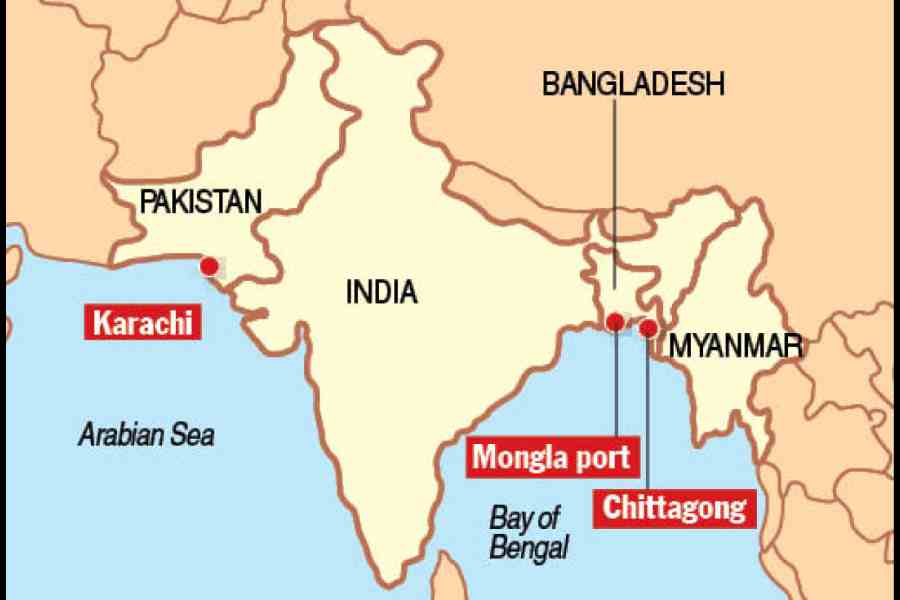A cargo vessel from Karachi docked at Chittagong on Wednesday, marking the first-ever direct maritime contact between Pakistan and Bangladesh since the Liberation War of 1971 but stirring up ripples of worry in the Indian security establishment.
Such direct maritime links between India’s eastern and western neighbours have the potential to create instability in the northeastern states because of their proximity to Bangladesh’s southeastern coast.
Syed Ahmed Maroof, the Pakistani high commissioner in Bangladesh who was present at the time of the docking of the cargo ship that ferried over 300 containers to Chittagong, said it was a “major step in bilateral trade”.
“This new route will streamline supply chains, reduce transit time and open up new business opportunities for both countries,” Maroof said.
The new regime in Bangladesh, after the Sheikh Hasina dispensation was overthrown, welcomed the direct sea link and hoped for a spike in the volume of trade with Pakistan. The trade volume had fallen below $800 million in 2023.
Amid the euphoria in official circles in Bangladesh and Pakistan, a Bangladeshi strategic affairs expert flagged the concerns that India may have with the new-found bonhomie between the two countries, which had testy ties even three months ago.
“Chittagong and Mongla are the two major ports in Bangladesh and both have been out of bounds for Pakistan for over five decades.... Trade between the two countries used to take place through transhipment at Singapore or Colombo,” the expert said.
“Now that Pakistani vessels will directly come to Chittagong, you cannot rule out the possibility of contraband being shipped to Bangladesh and ending up with insurgent groups in India,” he added, recounting the 2004 arms haul in Chittagong that still is the biggest confiscation of illegal weapons in South Asia.
In an operation by Pakistan spy agency ISI, about 1,500 Chinese munitions, worth an estimated $4.5-to-7 million, had reached Chittagong in trawlers through the sea route. Most of these consignments were, however, confiscated before they could reach their intended recipients — the banned militant outfit Ulfa in Assam.
The Indian establishment has been overtly cautious about the sea channels connecting the Chittagong and Mongla ports since then and used its relationship with Hasina to keep the Chinese away from the two ports.
“Last year, India scored a strategic win over China by securing the operating rights to a terminal at Mongla port.... But now, Pakistan has gained access to Chittagong port. The sea channels to the two ports will now allow Pakistani vessels. The development will surely have an impact on the region’s geopolitics as Myanmar is also so close to Chittagong,” said a source in India’s security establishment.
Myanmar remains in a state of flux and has caused considerable anxiety in India’s security establishment over infiltration and narco trade.
Although no details were available on the goods the cargo vessel brought to Bangladesh from Pakistan, multiple sources told this newspaper that some large containers were initially taken off the ship before the rest of the consignment was offloaded.
“Some 40ft containers were first taken off and the local police were pressed into service to create a security ring around them.... This is not a normal practice. You cannot rule out the possibility of contraband items entering Bangladesh,” said a source, who had worked closely with Hasina.
The opening of the direct maritime link is being seen as an attempt by the interim government led by Muhammad Yunus to cosy up to Pakistan. India’s western neighbour was a pariah in Bangladesh during the tenure of Hasina, who fled the country on August 5 in the face of a wave of protests.
Bangladesh, formerly known as East Pakistan, was born as an independent nation after a nine-month war with West Pakistan in 1971 in which India sided with the freedom fighters.
Though some Pakistan-friendly regimes — like the army dictators who ruled for over 16 years and the governments run by the Bangladesh Nationalist Party — were occasionally at the helm in Bangladesh, its ties with India grew over the years, especially during Hasina’s premiership between 1996 and 2001 and then again between 2009 and 2024.
“Bangladesh is in a reset mode after Yunus came to power.... And one of their priorities seems to be distancing themselves from India and engaging more with Pakistan,” said an Indian observer.
“Pakistan primarily exports different forms of cotton to Bangladesh while it exports jute products.... It will be impossible for Bangladesh to replace India as its foremost source of exports. Our concerns are over security in the region because of the growing bonhomie between Pakistan and Bangladesh,” the observer added.
Already, the Bangladesh Navy has confirmed its participation in Aman 2025, an international naval exercise to be held in Pakistan.
“This is the first time Bangladesh will take part in the joint exercise.... Last month a frigate left for Pakistan for this purpose. These developments must be worrying India as it may face fresh challenges in the Bay of Bengal and the Indian Ocean,” said a Bangladeshi expert.











